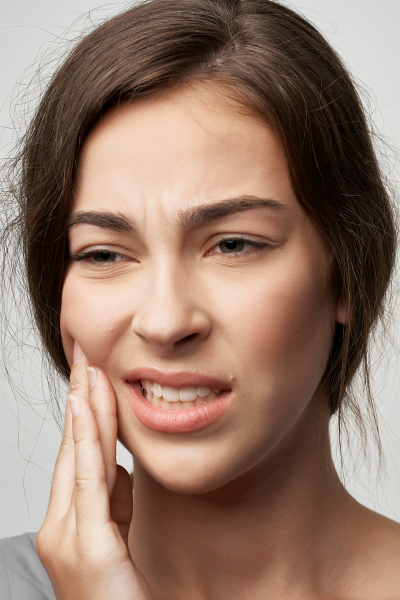Yellow Teeth Despite Good Hygiene
 My daughter has an ongoing problem with yellow teeth and cavities despite our hygiene routine of brushing, flossing, and limiting her sugar intake. Our pediatric dentist put sealants on my daughter’s upper and lower molar teeth. Still, I think her plaque buildup is unusual because we limit her sugar intake to once every other weekend. I’m unsure if her yellow teeth are genetic because my husband was an only child, and his parents died when he was 2. My daughter is entering her pre-teens, and we are concerned about her self-image. I haven’t seen any improvement with dental cleanings at the pediatric dentist’s office either. I feel that her dentist thinks I am overreacting. I’m concerned. Are we overlooking something, or am I genuinely overacting? Jada from WV
My daughter has an ongoing problem with yellow teeth and cavities despite our hygiene routine of brushing, flossing, and limiting her sugar intake. Our pediatric dentist put sealants on my daughter’s upper and lower molar teeth. Still, I think her plaque buildup is unusual because we limit her sugar intake to once every other weekend. I’m unsure if her yellow teeth are genetic because my husband was an only child, and his parents died when he was 2. My daughter is entering her pre-teens, and we are concerned about her self-image. I haven’t seen any improvement with dental cleanings at the pediatric dentist’s office either. I feel that her dentist thinks I am overreacting. I’m concerned. Are we overlooking something, or am I genuinely overacting? Jada from WV
Jada – Your concerns are valid. Dental plaque generally builds on teeth that are not flossed regularly. Plaque is colorless, but as it hardens, it forms tartar or calculus that is yellow or brown. If you have a good oral hygiene routine and regular dental cleanings for your daughter, her teeth may be darkening internally.
What Are the Causes of Yellow Teeth?
Causes of yellow teeth may be genetics, vitamins, medication, medical conditions, or what they eat or drink. However, foods and drinks generally cause external stains. If you have persistently yellow teeth despite daily flossing, brushing, and regular dental cleanings, potential causes include the following:
- Genetics – Some genetic conditions can cause the inner layer of the teeth, or dentin, to become yellow. Also, genetic disorders can cause tooth enamel to become thin or discolored.
- Vitamins and medication – Certain vitamins, supplements, or medicines can also cause staining.
- Medical conditions – Certain diseases, such as calcium deficiency, celiac disease, or liver disease, can affect tooth enamel and cause discoloration.
- Food and drink – Dark foods and beverages like coffee, tea, soda, and certain fruits can stain teeth.
We recommend you continue to ensure your daughter flosses between her teeth daily and brushes twice daily. Speak with your daughter’s pediatric dentist and ask for help detecting the cause of teeth stains or discoloring. You may also get a second opinion from an advanced cosmetic dentist who enjoys treating children. If necessary, a dentist can work with a pediatrician to determine if there is a medical cause of the tooth discoloration.
Rocky Hill, Connecticut, cosmetic dentist Dr. Thaddeus Michalski sponsors this post.
Why Can’t I Get Toothache Relief from My Dentist?

My dentist says the tooth looks fine on the X-ray, and the problem is likely neurological. He said I could get my lower left teeth extracted and replaced with dental implants, and I would still feel like I had a toothache. Do I need to see a neurologist or another dentist to get toothache relief? – Thanks. Ryleigh from GA
Ryleigh,
We are sorry to hear about your discomfort and lack of resolution. It is common to feel a toothache when the pain is from another source.
Why Can’t You Get Toothache Relief from Your Dentist?
The reason you cannot get toothache relief may be due to the source of your discomfort. Sometimes, pain from one tooth refers to another, a neurological problem may exist, or a gum or sinus infection may be the culprit.
What Are Potential Toothache Sources?
The following concerns can make it challenging to find the source of your toothache:
- Referred pain. At times, an upper tooth infection may cause a lower tooth to feel like it is the source of the pain. Or, an adjacent tooth may have a cavity or infection. Although referred pain does not occur from one side of the mouth to another, it can come from opposite or adjacent teeth.
- Although it is rare, nerve dysfunction can feel like a toothache. Your dentist may be correct that your symptoms are neurological, making it challenging to get toothache relief. Trigeminal neuralgia and migraine are two conditions that can cause tooth pain.
- Sinus or gum infection. A sinus infection can cause upper teeth to feel like they are aching. The sensation from upper teeth can refer to lower teeth. Treating the sinus infection can give you toothache relief. Also, a gum infection or food trapped between teeth and gums can cause tooth pain. Sometimes, receding gums can cause tooth pain. Gum disease treatment or professional dental cleaning can relieve your symptoms.
- Teeth grinding or clenching. If you grind or clench your teeth, the pressure can eventually cause a toothache. A custom nightguard can relieve the stress of grinding your teeth and decrease your symptoms.
If your dentist cannot identify the cause of your discomfort after reviewing your X-ray, refer an endodontist (root canal specialist) or see a skilled dentist for a second opinion. An endodontist’s advanced training can help them determine if your tooth is the source of your discomfort. If the specialist agrees with your dentist, you may need a neurologist. Your dental and healthcare providers can collaborate to give you toothache relief.
Dr. Thaddeus Michalski, a Rocky Hill, Connecticut dentist, sponsors this post. Read why his patients think he is one of the best dentists near the Rocky Hill/Hartford area.


